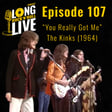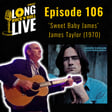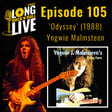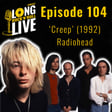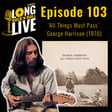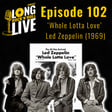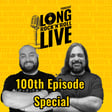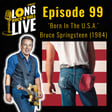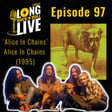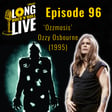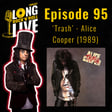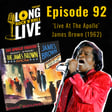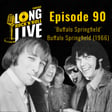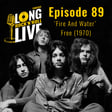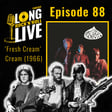Become a Creator today!Start creating today - Share your story with the world!
Start for free
00:00:00
00:00:01

86. 'Purple Haze' - The Jimi Hendrix Experience (1967)
From pioneering guitar effects like fuzz, distortion, and feedback to groundbreaking studio techniques, Jimi Hendrix’s ‘Purple Haze’ crafted sounds that redefined the guitar’s role in rock music. The song’s iconic opening chord and layered production pushed boundaries, while its sci-fi-inspired lyrics and spacey feel turned it into a psychedelic anthem. ‘Purple Haze’ pushed rock into experimental and heavier territory, inspiring a generation to explore bold, intense musical styles.
#JimiHendrix #PurpleHaze #Rock #Guitar
Transcript
Introduction and Impact of 'Purple Haze'
00:00:00
Speaker
Hello there and welcome back to another episode of the Long Live Rock and Roll Podcast. From pioneering guitar effects like fuzz, distortion and feedback to groundbreaking studio techniques, Jimi Hendrix's Purple Haze crafted sounds that redefined the guitar's role in rock music. The song's iconic opening chord and layered production pushed boundaries while its sci-fi inspired lyrics and spacey feel turned it into a psychedelic anthem.
00:00:27
Speaker
Purple Haze pushed rock into experimental and heavier territory, inspiring a generation to explore bold, intense musical styles.
Meet Felipe Amarin: Discussing 'Purple Haze'
00:00:36
Speaker
Joining me to discuss this song is my co-host, Mr. Felipe Amarin. How are you doing, man? I'm great, man, and you? Good, yeah, good, thank you. Another one of these um song episodes. You've only done one so far, and we we did American Pie by Don McLean, which definitely deserves its own um so an episode. But we thought, why the hell not? and Purple Haze deserves one as well. Yeah, there are some songs that really stand out and really change the course of music his history. yeah This is one of them. Very, very rare. so Loads of albums, but one song is quite rare.
Audience Engagement and Podcast Reviews
00:01:06
Speaker
Yeah. um Just in terms of conditions before we crack on. ah If you're listening on Apple, Spotify or Amazon or any of your podcasting platforms, please go down and scroll down, give us a review, give us a little five star rating, write a little comment on what you think of the show. It's basically going to get us seen by more people and we're going to reach a wider audience.
00:01:23
Speaker
of like-minded music folk like yourself and if you're watching on YouTube please make sure to like and subscribe so you stay up to date with our new content and see what's coming out.
Hendrix's Guitar Innovations
00:01:32
Speaker
So Purple Haze, we're just going to basically talk about why it's so important and why it was such a groundbreaking um song and I think the most obvious place to start is the guitar because obviously Mr Hendrix was ah was a man of the guitar and he did a lot of lot of stuff on the guitar that was very unconventional at the time.
00:01:50
Speaker
um For example, you know, ah the fuzz pedal that he was using and the the distorted tone he had on his guitar, along with um so much feedback, isn't it, in the song? yeah Loads of moments where the guitar is actually just making a nasty noise. Now, but it should be noted that these were used before, but in the way that Jimi Hendrix mastered and controlled the level of the fuzz distortion and feedback, that was insane, wasn't it? Yeah, exactly. And you have the ah um there's they they There's a track, of well, they did a little bit of speeding up with a track as an a guitar. There's a solo at the very end of the song if I'm not wrong, which is basically speeding up a guitar solo. And yeah, he wanted to experiment with music and sound and production. And I think he was kind of frustrated with his early um ah years as as a musician because he wanted to be original and do his own thing, but he was get
00:02:49
Speaker
getting paid to play as a session guy or as ah as a a hired gun for for singers and and other guitar
Chas Chandler's Influence on Hendrix
00:02:59
Speaker
players. So he wasn't really really pleased with the stuff he was doing before before getting the chance to do his stuff in the UK. I think that was the reason why he he was brought to the UK by Chas Chandler, who was a producer who brought him to the UK.
00:03:14
Speaker
and And he was looking, he was trying to set Jimmy free. That was it. It was like, this guy is a genius. People don't understand. We need to put him in studio with someone who understands you know, ah what he's trying to achieve, you know.
The Devil's Chord: Tritone in 'Purple Haze'
00:03:33
Speaker
And the band, but you know, the Jimmy, i I like the band of gypsies, I like everything ah Hendrix did, but I think that Jimmy Hendrix's experience is such a great band as as a power trio, and and yeah and um the bass and drums are a huge part of of
00:03:51
Speaker
ah of how weird and great the song is. Yeah, and I agree. um As well as that. So, you know, even the but the the other thing that Hendrix did a lot, especially in his early um in this these albums,
00:04:04
Speaker
was experimenting with odd harmonic choices. And we hear that right from the start of Purple Haze. That chord is what we call a tritone, or what we call the devil's chord. And it's playing what you call the, so this is a bit of music theory. um A normal power chord on a guitar is where the notes of a scale, you play the root note, you go up a string, two frets up, and you play the fifth the fifth of the scale, and then you up one more string, and that's the octave. So it gets a really beefy power chord.
00:04:35
Speaker
and it sounds good because the root notes being emphasized in the root and the octave and the power cut and the fifth just adds adds a bit of beef to it. If you flatten the five which means taking it down a semitone you get this horrible hellish kind of sound which is called the devil's chord aka a tritone and this is not usual this was not usual. You got it a lot in the in the
00:05:01
Speaker
1900s through classical music some of the avant-garde stuff that was a bit out of there you know Stravinsky and his firebird suite that would have a lot of dissonant stuff that wasn't nice to the ear but in pop and rock music to have a sort of a dissonant chord was quite unheard of so for Hendrix to open up the song with what with the most dissonant chord of them all it's like what's he doing what's he what's this guy doing yeah and and and he he wanted to get away from from the normal song structures that people were doing. So the thing is, so you have that mix of ah
00:05:36
Speaker
sounds or effects that he was kind kind of trying to create.
Breaking Musical Boundaries
00:05:41
Speaker
ah You can't say that he was the only one experimenting with sounds and pedals and amps, because he had Clapton, he had Jeff Beck, all those guys. But back and in you know the that time, most people were still kind of tied to blues songs.
00:05:59
Speaker
you know structures like 12 bars or 16 bars or 8 bars are typical song structures with with typical chord progressions and let's say always melodic approaches to to to um solos and riffs. yeah And he was kind of, let's put it the dissonant sound right in the beginning. yeah It's like it's not radio friendly. And it's, ah you know, it's it was I think it's it's a it is a choice of a man who wasn't afraid of being criticized and wasn't afraid of never making it in the music industry. He was like, I'm gonna do my sound. I don't care if people like it or not.
00:06:39
Speaker
exactly um and I mean the influence of what he did and how dark he went with his music is just it can't be measured because three small years later another band started their first ever song with the devil scored and would go on to create heavy metal so yeah we're gonna get to that later in the episode but yeah I mean ah for his guitar ring I mean it's just the way that I know that the the production we're going to talk about in a second and he did he was able to layer multiple guitars but his switch in the live performance and in the studio to just go between rhythm and lead guitar is unreal
00:07:17
Speaker
Now we've played with a few guitarists and the gentleman we played for, Jack, he was good great as well, wasn't he? Because he could he'd play rhythm whilst he'd sing and then like next time you know it, you're in a solo, where he's doing some motifs or melodies. that's quite That's quite normal in the blues rock scene. But for Hendrix to do it, mid 60s, on his own in a power trio with no secondary guitar backing him up. There's moments I've seen live on stage where he plays a chord the chord rings out, or he's got like a harmonic, so the note rings, and he goes up and does a little twiddle, and comes back and does this rhythmic thing, and then goes up and does something else solo-y. He was just a master craftsman. Yeah, he's up and down the guitar neck all the time, and he's on the fretboard, and you know, up and down the fretboard, like
00:08:01
Speaker
eight It's like any part of the guitar is familiar to him. yeah He could use the whole instrument and all the available effects of the type with such a fluency that it hasn't been seen before, I think. And because he had because he he he famously turns his guitar around so it flips over.
00:08:21
Speaker
So normal chords were not normal for him because a normal chord you have, you're nice, you know, you got your, as I explained earlier, you could, it makes sense in a normal guitar. I'm not going to try and explain it over this podcast, but it works for the fingers. So when you flip the guitar over, it doesn't work as well. So the design of the guitar wasn't for that kind of the guitar player. He had to restructure his way of thinking about the instrument, which I think is also really interesting.
00:08:47
Speaker
and because of that you've got a lot of unconventional chord voicings which were just not normal for rock and blues at that time yeah he gone did you want to say something i think there's something about that it's like i think his personality uh came through you know uh uh the music it's it's some people they can like create a set of rules when they're writing music and just stick to it and doesn't necessarily reflect who they are as as a person. And Hendrix was a kind of over the top character. He was like, you know, the way he dressed and and the way he talked and he he was that, you know, um
00:09:24
Speaker
you know i don' know I don't know how to explain that. I think it's just he's just he he he was so passionate about life and human connections and playing and writing and singing and everything. So you can hear in his Yeah. Yeah. It's not like, yeah, well, I shouldn't do this because, you know, um as a matter of fact, he wrote about 10 pages of lyrics for for for the song. Over over a thousand words he just was doing. And that was the the one point where the producer said, well, you know, we could you know cut it short. and But still, the essence of of ah of
Studio Techniques: Crafting Complexity
00:09:59
Speaker
of his creativity is there. So it's not there's nothing in in the song that is not, in my opinion, 100% original. It's one of those. object well It's almost like you cannot compare it to anything else that has been done before. ah Or much that came since. It's very, very special, isn't it? um yeah Moving on to the studio techniques used. Now, it's not like there's a litany of them, but there are a few examples. The use of panning.
00:10:25
Speaker
as well, because several times, especially at the end, I remember it's that solo part where he goes, do, do, do, do, do. And it goes from the left to the right. It's like this circling in your head, which again, man, for us nowadays, it's normal for 1967 to have his voice going round from one ear to turn to the other and then all the way round to this. It's crazy, isn't it? Just like, you know, and it's like you said, it's just him putting his personality into it. And maybe the producer as well.
00:10:55
Speaker
Eddie Kramer was the ah the sound engineer, maybe producer as well for the session, I'm not quite sure, but he was ah ah he was called to do this recording. So remember, so the the first recording Hendrix and his band did was um Hey Joe, which is a cover song. So that night that's them kind of, okay, we got to break the rules, but it's not still an original song. yeah And it charted to the point that they made some money on that they could actually do a whole album after that. And So they knew that Hendrix wasn't a ah predictable a character or or a yeah a musician that you could just keep under the control. So they called Eddie Kramer because he was, um basically they said, I don't know who who said this to him, but whoever hired him, I think was Chance Jandal, I said to him like, we know that you can
00:11:49
Speaker
can create some weird sounds. And this guy's kind of crazy, and he's got some weird ideas. He wanted to work with him. on And he said that and the Hendrix waling like walked the studio, and he was kind of shy. And he was like, oh, hello, how's it going? And he did a sound check. And as soon as he started playing, Eddie Kramer was like, wow, this is this is something else. I've never heard anything like this.
00:12:16
Speaker
and And you can hear it in the song because then something else that you've never heard anything like happens in the studio, isn't it? But when you get those minds together, you know, yeah um the the only other part I want to talk about the production techniques was the multitracking involved because that was pretty innovative for the time. and You know, and and I think it's just important to note that, hold on, um we'll get to it a bit when we talk about the cultural impact, but This song really did bring two worlds together. Psychedelic music and rock music merged them. We know that you know the Beatles were playing in with rev with psychedelic music in Revolver in, is that 64?
00:12:53
Speaker
But they weren't rock songs. You know, what's the song with the, um is it tomorrow, tomorrow never comes? Tomorrow never knows. That's not a rock song, but it is psychedelic. But in that same album, they have a rock song that's not psychedelic. Hendrix brought them together and he married these things. And a part of that was um multitracking and being innovative with techniques and because of that he was able to get multiple guitar layers on top of each other, harmonize himself, make it sound beefier, give it another another texture um which gives you a fuller and much more complex sound. How do you have the guitar as the um
00:13:31
Speaker
the main thing for real, like and in a way that probably again hasn't happened in any other album. So the guitar is the main voice of the song, partially because he wasn't comfortable with his own vocals. Do you believe in that? It's it's insane. I think he's I love her the way he sings and is so expressive. Yeah, so conversational. But is he didn't like his own vocals. He would always be like, oh, is it good enough? should it Should we do another take whilst with the guitar? He was totally confluent. Yeah, and fluid yeah brilliant.
00:14:00
Speaker
um You want to talk about the lyrics? Yeah, the lyrics, right. there's this Okay, how many different stories we've we've heard about about these lyrics, right? So ah the everything approach is yeah common approach solid this song is just about you know getting high. It's just about drugs or whatever. And Hendrix never said that. Okay, yeah, he did experiment with drugs as well, but I don't think that was um that has never been the main thing about but his music am i might be wrong about this but he never said it was specifically about drugs there's there's a few different versions you said something about it i was just gonna say tell me your your version of it and oh no no no just purely that he yeah i read that he said it's not about drugs but yes he literally said it's not about drugs yeah you carry on
00:14:45
Speaker
Well, you said he wrote ah he he read a novel and then had
Interpreting Mystical Lyrics
00:14:49
Speaker
the idea. Oh, yes. So yeah, go on. Yeah, about about ah he had a dream about sci fi novel he read. And that's, that's all I wrote. that's Oh, so that's the dream. Okay, ga so that's pretty much the same story. because i you tell He said he had a dream that he was walking underwater.
00:15:04
Speaker
Um, the, you know, the way he's describing the feeling of, of that dream. So yeah, if he was on drugs before he fell as asleep, we don't know. So it might have been, uh, is also in a nod interval. He said it was about a woman he met and then, you know, who literally put a spell on him. So, uh, so that's that. So it can be about a woman. It can be about a psychedelic trip. It can be about.
00:15:29
Speaker
a dream all together. And i think um I don't think we need to get to a conclusion about this. I think i think that yeah when you're a proper poet, and I i insist on this, we've talked about Hendrix before, and i I think because he was such a master of his craft as a guitar player, people simply forget that he was writing amazing lyrics.
00:15:53
Speaker
And yeah some of the best lyrics in in rock music, they're easy to memorize, they really communicate with you, and at the same time, they do not deliver the full story. No, it leaves you on the edge wanting more. Yes, exactly.
00:16:09
Speaker
Yeah, exactly. And it's ah is' also like, what is it going on about? It makes sense. The words make sense together. the The whole concept of the lyrics is it's there, but you don't know exactly what it's all about and leaves it to your own interpretation, which I think are the For me, those are the best kind of lyrics when you tell a little bit of a story, but you you let people get to whatever conclusion they want to get to. And and his approach to to to to to life and performance was that, because like ah he was criticized for being like over a sexual on stage with the way he was moving and with the guitar. And he said, if you want to point at one thing that I'm doing and want to make the whole performance about that, OK, it's up to you. I don't care.
00:16:54
Speaker
I'm doing my thing. So he was like, this is my music. This is how I dance. This is how I sing. This is how I play. These are my lyrics. I'm doing like, I don't care. He didn't, he really didn't give a fuck about what people were saying. And I think that's amazing. And I think we need more of that in music now. yeah So yeah, so that's so again about the lyrics. So um you can see this there's this there's some verses where you actually have the reference to to a woman, like um OK, I like this when it says, don't know if I'm coming up or down. Am I happy or in misery? Whatever it is, that girl pull a spell on me. So he's talking about the girl who put a spell on him. What kind of spell ah is it literal? Is it not? And and the the whole confusion. And I think that confusion. Am I happy or in misery? That's great, because like how many times do we have that? good Why do songs have to be about being happy or being sad?
00:17:45
Speaker
yeah How many times in our lives we have a feeling that we can't describe like you're falling in love and you don't even know if that's a good thing for you. You don't know if that's going to bring suffering. So you're like ah confused about that feeling. Aspects of happiness. Aspects of sadness and it's just it's it's confusion and chaos in a way. you know I love that. I like um talking of confusion. I love and I read a story that There's certain lyrics on there throughout rock history where they've been misinterpreted. And one of them, my dad told me that in the 70s when Queen released A Night at the Opera on Bohemian Rhapsody, um there's the lyric that's sparing his life for his monstrosity.
00:18:28
Speaker
yeah my dad and his brother my uncle thought sparing his life for his pork sausages oh exhaust that they they said they had they weren't they weren't messing around they weren't but oh you should say pork sausages they couldn't hear it they didn't have the lyrics and the well why the hell I mean, well, listen, this song's about seeing silhouettoes in a man, so why the hell not pork sausages? so but But, you know, we have lyrics like this throughout history. And another one is in the first verse, where I believe a lot of people thought he said, excuse me, while I kiss this guy. I kiss this guy. But I've kissed this guy ever. Kiss the sky. So that's another one. And I just love this man because the whole song, lyrics, music, attitude,
00:19:10
Speaker
This is why that the piece of art behind me, for those watching on YouTube, this is I love this piece of art, might be one of my favorite pieces of musical art ever. Because, you know, I'm going to turn my camera off so you those watch opops that's wrong so those watching can see it. There we go. ah Because for me, this just exudes everything about the song. Is it the smoke from smoking a spliff? Or is it a dream where there's aliens coming down and or and his guitars smoking because he's playing it so well?
00:19:40
Speaker
The clouds above him. Are they clouds or are they like acid bubbles because he's in ah he's in an augmented sci-fi dream? I don't know. And we don't know. It's a beautiful artwork. but But I just love that this song has this mysticism, this psychedelia about it in the lyrics, in the music, in the guitar, in the production. It's just brilliant, man, isn't it? And iconic works, I'm sure. First time I've heard that song, it really shocked me in a way. And I thought, imagine this in the 60s.
00:20:08
Speaker
yeah it's kind of shocking now yeah still yeah like still it's like every time how can you start a song with that really oh excellent um all done with the lyrics yeah yeah okay let's move on to the cultural impact never done with the lyrics no felipe's never done actually before we talk about the impact of the song i'm gonna have my little say about uh about heavy metal ah surprise surprise because this song is quite often associated with the inception of heavy metal now when you're first when you first if there's any metal heads out there listening or watching um maybe you've gone through the same experience where you you get into heavy metal you hear a bunch of these new bands from the 2000s
00:20:52
Speaker
You do a bit of research and your world thinks that Iron Maiden and Metallica started Heavy Metal. that's how you Until you do more research, that's what you think Heavy Metal started with. And then you go back and you realise, okay, Judas Priest, and then you go back and you see Black Sabbath. When you go further back than that, you have obvious songs like Helter Skelter by The Beatles, In a Garda La Vida by Iron Butterfly. These proto pre-metal songs.
00:21:17
Speaker
Now, one that isn't included enough, in my opinion, is Purple Haze, and there's a few reasons.
Influence on Heavy Metal
00:21:23
Speaker
So on my notes, distorted, fuzzy, heavy guitars is the primary sound of the of the Purple Haze and heavy metal. Purple Haze, the sound of his guitar was such a major departure from the cleaner tones they had in rock. I know that in um the Kinks with All Day and All of the Night, and um also so the one that Van Halen covered,
00:21:45
Speaker
Oh, you really got me. You really got me. That distorted guitar intro. but that But then it goes on as if it's a pop song just with a bit of distorted guitar behind it. Especially in terms of structure and lyrics. Exactly. But Purple Haze, just on the guitar for now, distorted, fuzzy, heavy. um And it really opened the door for musicians to be like, oh, wow, what? This is acceptable now. Cool. Let's see where we go with this. And three years later, Tony Iommi on his distorted guitar playing the tritone chord I won't say any more. um As I just said, dissonance in the opening chord, extremely similar to what Sabbath did three years later. The main aspect of Purple Haze is a riff. A riff, not a chord progression, not a melody, not a solo, a riff, which is a key part of heavy metal. yeah i'd I'd argue 95% of heavy metal is riffs.
00:22:38
Speaker
Yeah. And it's how you recognize a metal song more than lyrics and vocals. It's the opening riff. no Yeah, exactly. And in terms of ah performance, his aggressive playing, the loud volume, the powerful attack on his guitar. You watch him slap that guitar sometimes, doesn't he? He'll put his hand out to do like to its way to the audience and then he'll just smack it. But the strings don't break. I never got how that happened. ah Lots of feedback, you know. And this was all a precursor to the attitude and energy of Heavy Metal.
00:23:06
Speaker
just not giving a fuck and being like, I'm gonna play this loud, hear my guitar. um And that that's it really, just that the freedom, the volume, the distortion, the intensity that Purple Haze brought to us allowed and inspired a whole new generation of musicians to to pursue sort of heavier music and a more aggressive style of rock that would then turn into heavy metal. so I just wanted a few minutes on that to say that for the metal fans out there it's important to know that Purple Haze was a significant moment in the steps taken towards Black Sabbath doing what they did three years after it was released. Definitely, it's it's definitely there, you know, the connection between this song, not between Hendrix music in general but this song and what Black Sabbath was doing, yeah ah only about
00:23:57
Speaker
three years after that. Maybe two years before they actually record the album they will do. It's kind of obvious isn't it? When you hear them together you're like okay I see. yeah um Anyway let's talk about the cultural impact of the album you know so as I said earlier it really did combine together psychedelic music and rock music and we kind of had this new genre that emerged from here because only was it a year after this Pink Floyd did their first album or was there 67 as well? But anyway do you know I I thought was 67, but I could be wrong, let me check. Yeah, Piper at the Gates of Dawn, 67. And was released late 67. So, you know, this whole prog, this whole psychedelic meets rock really kicked off in the late 60s and Purple Waze was a big part of that.
Psychedelic Rock Fusion
00:24:50
Speaker
Exactly. A pioneer in many ways, wasn't it? You've got to consider that that you know he was attracting like ah some some interesting characters to the audience. right like Eric Clapton used to come to his gigs. Paul McCartney used to come to his gigs.
00:25:06
Speaker
so it's you know, those guys admired him. The guys that we've we've learned to admire as some of the best musicians in history, they were Jimi Hendrix fans. yeah but In a recent interview, Paul McCartney mentions Hendrix as his, lot rather than how recent that is, but anyway, he mentions him as as a as his favorite guitar player of all time. Wow, there you go, that's enough credit.
00:25:28
Speaker
um As you said, yeah, the this new style that Hendrix found with this song really bridged the gap and it opened him up to newer audiences and it opened newer audiences and musicians up to the fact that it's kind of like, well, hold on, we can do this. We can of mix these two things. We can take heavy music and mix it with psychedelic lyrics and production. Just amazing.
00:25:50
Speaker
Yeah, and I think how big of a departure that is from Hey Joe, his first single. Yeah. So like, he's done something. Yeah, the guitar, the crazy guitar sounds are there. His his unique vocal interpretation is there. But it's a song that was already well known and it wasn't his own thing. ah So it's not It's not too much of an innovation, right? Yeah. And then, straight to Purple Haze, it's almost like... Tips on his head. Yeah, it's almost like, what the hell is this? And I think, um because he wasn't playing safe, and he was told to do whatever he wanted to do,
00:26:27
Speaker
um There was a big risk that it wouldn't be a commercial success. it wouldn't it would He could have been a total failure because people could simply reject that kind of ah i don't know that that level of craziness in music. And I think the fact that he succeeded with that made a lot of musicians all over the world think, wait a minute, why do I have to stick to a formula? Why can't I just create my own way of doing things? Yeah, perfect.
00:26:55
Speaker
Excellent. Shall we conclude with my monologue on Purple Haze?
Conclusion: Cultural Impact of 'Purple Haze'
00:26:59
Speaker
Right, here we go. Purple Haze was a groundbreaking piece of music that changed rock music both musically and culturally. Masterfully using fuzz, distortion and feedback, Hendrix created deliberate controlled sounds that that redefined the guitar's potential.
00:27:16
Speaker
The song's dissonant opening chord introduced a level of uncomfortability, rare for rock, while Hendrix's unconventional chord voicings and effortless shift between rhythm and lead showed an unmatched skill on the instrument, inspiring musicians to experiment boldly with the guitar and its effects. In the studio, Hendrix's use of panning, feedback and multitracking gave the song a full, complex and spacey feel which perfectly captured the psychedelic spirit of the 60s.
00:27:43
Speaker
Culturally, Purple Haze embodied the era's counterculture. Its dreamy sci-fi lyrics made it an anthem of perception and exploration, rather than a song about drugs. Fusing rock with psychedelic themes drew in diverse audiences and helped push rock toward a more experimental sound. As well as that, protometal elements would later shape the intensity and rebellious energy of heavy metal.
00:28:06
Speaker
Ultimately, Purple Haze pushed the boundaries of rock to such an extent that I don't think the lasting effect of its legacy and influence can be measured. It's undoubtedly one of the greatest pieces of guitar music, but more importantly, one of the best and most pioneering, innovative and important rock songs. Well said. It's a classic, isn't it? A classic, yeah. Undeniable. yeah Anyway.
00:28:31
Speaker
Thank you for joining us, guys, on this special little... Well, I say it's special because we've only done two of these song episodes, but I'm sure, you know, so I hope you guys have noticed we're putting episodes out more frequently now. We've moved to one a week. So there might be occasions, you know, because, you know, we're only human. We both have lives. We both have jobs. There might be a week where our research time is a bit limited and we might just pop on and do a song episode like we've done today um because it's been great and I love it, man. As awesome as it is, div you know, diving into albums,
00:28:57
Speaker
sometimes just looking at one song and extrapolating all the details can be really satisfying, can't it? Yeah, exactly. I've listened to that song about 10 times today. And I'm going to go and listen to it 10 times more afterwards. she As I was saying, thank you very much for joining us. If you're listening on Apple's Spotify or Amazon, please scroll down, give us a little review, give us five stars, write us a comment because it's going to help us fly up the chart and be seen by more people and reach a bigger audience. And if you're watching us on YouTube,
00:29:27
Speaker
Please make sure to like and subscribe so you stay up to date with new content. We'll see you very soon. Yeah, thanks for being with us. Give us the likes and all that stuff that happens on the internet, whatever that is. And yeah, keep on rocking everyone and don't do anything I wouldn't do. And as usual guys, take care and long live. Rock and roll.
